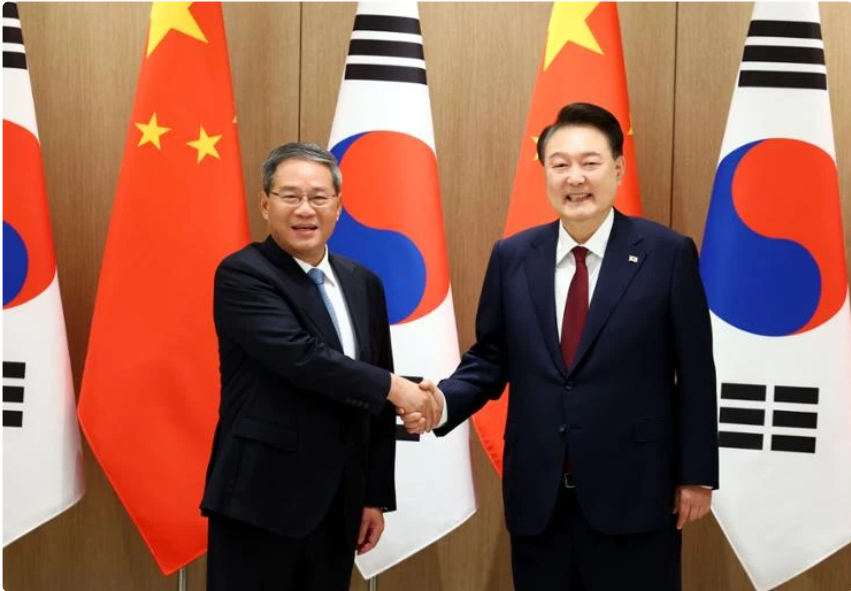Resetting high-level dialogue framework
The first summit between South Korea, China, and Japan in more than four years was in fact the new reset of this trilateral highest-level dialogue forum and a new restart of this tripartite relationship.
After two days of bilateral and trilateral between South Korea's President Yoon Suk Yeol, China's Premier Li Qiang, and Japan's Premier Fumio Kishida in South Korea's Capital of Seoul, the overall impressions of this memorable event was that a new page has been opened in this trilateral relationship. There is broad consensus on almost all issues and the summit's agenda. Criticism was nearly put aside. The Three all spoke of "Resetting and Restarting" their relationship, of a new beginning and departure. Goodwill and optimism were in the air.
| South Korea's President Yoon Suk Yeol (r) and China's Premier Li Qiang (l). Source: Joint Press Corps |
All that clearly demonstrated that they shared the view and need to make the summit as big and great as possible success. So they agreed to restart the negotiation process on their trilateral free trade agreement. They talked about enhancing their cooperation on economic issues, especially on safe supply chain networks. They wanted to promote people-to-people and cultural exchanges, to tackle shared environmental, health, and other issues. No words about sensitive issues like Taiwan or the South China Sea, the war in Ukraine or Russia. One remarkable thing was their unity in calling for denuclearization of the Korean peninsular which promptly drew anger and protest from North Korea which is commonly considered China's close ally.
This summit couldn't clear up all existing disputes and reservations between them but reached a new approach to improve their cooperations in many fields despite remaining sensitive disputes and reservations. This was obviously the biggest and most important outcome of this event. Their relationship is still not fully normal but starting to advance.
South Korea took the initiative to facilitate this summit and China accepted it after not hidden hesitation for quite a long time. However the reconciliation between South Korea and Japan as well as the strengthening of the trilateral alliance between the US, South Korea, and Japan were the main reasons explaining why China has changed its attitude towards the revival of this trilateral dialogue format. China has a strategic interest in driving a wedge between South Korea, Japan, and the US. South Korea and Japan urgently need to improve their relationships with China because China is one of the most important trade partners for them and they want China not supporting North Korea and Russia. Russia is at war with Ukraine and in confrontation with the West. These two wars are now defining the fate and future of the West which Japan and South Korea belong to. If Russia and North Korea were supported by China, militarily and financially, they could in no way successfully deal with Russia and North Korea.
With this trilateral summit in Seoul, the relationship between South Korea, Japan, and China was brought back on track. But resolving their remaining disputes and interest conflicts is another story.
Disclaimer: The views expressed by Ambassador Tran Duc Mau are his own and do not necessarily reflect the opinions of The Hanoi Times.












